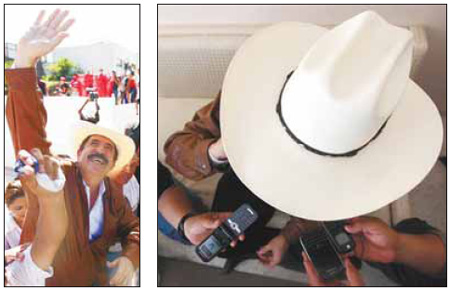Zelaya's return reignites Honduras crisis
|
The hat is back: After a jubilant return to Honduras, exiled president Manuel Zelaya holds a press conference by cellphone from the Brazilian embassy. AP |
TEGUCIGALPA, Honduras: The daring return of deposed President Manuel Zelaya has thrust Honduras back onto the world stage and posed a sharp challenge to interim leaders determined to hold new elections without him after a June coup.
Thousands of Zelaya supporters defied a curfew and spent the night surrounding Brazil's embassy, where the leader remained holed up yesterday, a day after slipping back into the country. In exile since June 28, Zelaya said he had traveled for 15 hours overland in a series of vehicles to pull off the stealth homecoming.
The government of interim President Roberto Micheletti ordered a 26-hour shutdown of the capital Tegucigalpa beginning on Monday afternoon, closed the airport and set up roadblocks on highways leading into town. The measures were taken to keep out more Zelaya supporters in an attempt to head off the big protests that disrupted the city after his ouster.
But Zelaya loyalists ignored the decree and surrounded the embassy dancing and cheering and using their cell phones to light up the streets after electricity was cut off on the block housing the embassy. Honduran security forces broke up a few demonstrations yesterday but there were no reports of arrest or injury.
"We're here to support him and protect him, and we're going to stay here as long as it's physically possible," said Carlos Salgado, 43, a jewelry maker from Zelaya's home state of Olancho.
Brazil's President Luiz Inacio Lula da Silva said he has asked Zelaya not to provide a pretext for coup leaders to invade the Brazilian embassy. Silva said he spoke with Zelaya by phone yesterday morning.
Silva said that by allowing Zelaya into its embassy, Brazil only did what any democratic country would do.
Supported by the US and other governments since his ouster, Zelaya called for negotiations with the leaders who forced him from the country at gunpoint. But Micheletti urged Brazil to turn Zelaya over to Honduran authorities for trial.
Zelaya said that he was trying to establish contact with the interim government to start negotiations on a solution to the standoff that started when soldiers flew him to Costa Rica.
Previous talks failed
Talks moderated by Costa Rican President Oscar Arias stalled over the interim government's refusal to accept Zelaya's reinstatement to the presidency under a power-sharing agreement that would limit his powers and prohibit him from attempting to revise the constitution.
In June, the country's Congress and courts, alarmed by Zelaya's political shift into a close alliance with leftist Venezuelan President Hugo Chavez and Cuba, backed the president's removal. He was arrested on orders of the Supreme Court on charges of treason and abuse of power for ignoring court orders against holding a referendum on reforming the constitution. His opponents feared he wanted to end a constitutional ban on re-election, a charge that Zelaya denied.
AP-Reuters
(China Daily 09/23/2009 page12)















